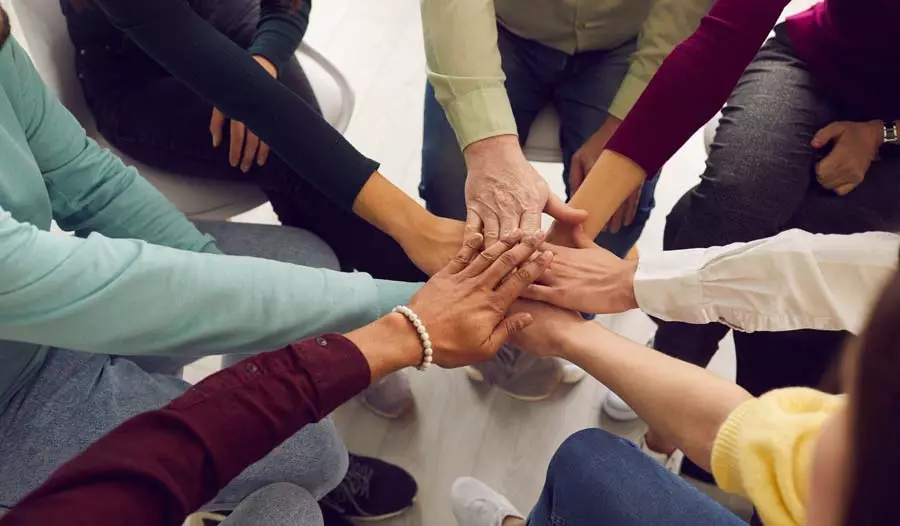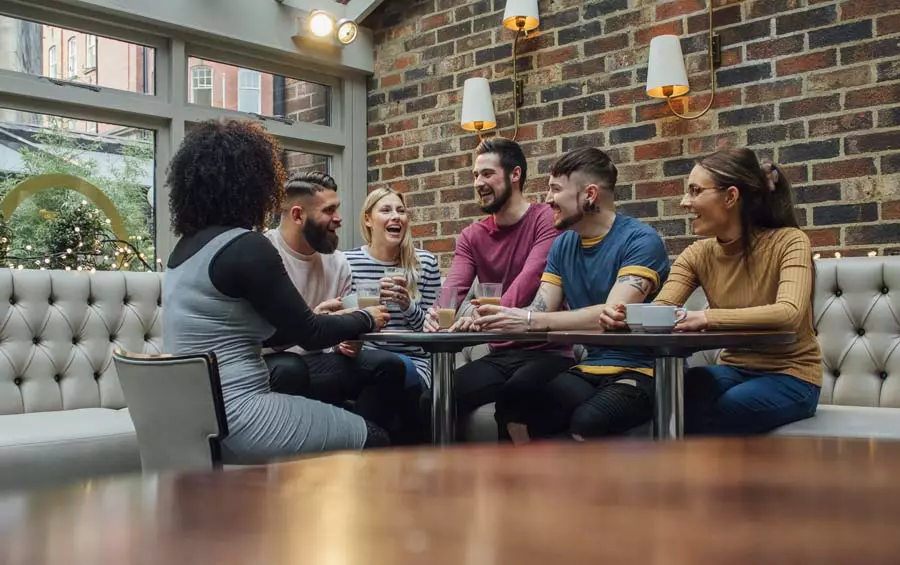Best Substance Abuse Group Activities
Many forms of addiction treatment are created with the building blocks of camaraderie and fellowship at the center. One of the oldest models of substance abuse treatment, the 12-step recovery model, uses group therapy and fellowship as one of its core elements.
Many believe that the 12-step recovery model is successful because users relinquish all control to a higher power. However, more forward-thinking and modern outlooks on the therapy would say that the effectiveness comes as a result of the group therapy dynamic of the program.
The human connections and face-to-face contact drive a positive change in participants, and feeling responsible for remaining accountable to others in the group is also powerful. In this article, we’ll look at group therapy and what defines this type of treatment in all forms.
What Is the Purpose of Group Therapy?
Group therapy, also called process groups or psycho-education groups, is a form of treatment that can be used in conjunction with individual therapy to help people recovering from substance use disorders (SUDs) develop the skills they need to maintain long-term sobriety. In group therapy, you meet with others who are also overcoming a SUD.
Together, you share experiences and support each other’s recovery. Group therapy is considered one of the most effective forms of psychotherapy because it allows a person to receive support from their peers and that offered by their therapist or counselor.
In group therapy, there’s no shame in admitting that you’ve been struggling. Everyone around you is going through the same thing, so it’s a safe place to open up about your struggles and learn from others’ mistakes.


It’s also a great way to make friends—each person brings unique experiences and insight into the room, making them all precious resources for each other. Group therapy allows people to practice communicating their feelings with each other and processing those of others around them (if they choose).
This can be especially helpful for people who struggle with learning how to trust others or being vulnerable enough to share their stories in an open setting. Group therapy helps people learn these skills because they have the support of everyone else working through similar issues around them; by being able to observe and participate in healthy communication between clients/patients/members/whatever term your group uses for itself.
Experience True Healing
Our deeply-caring staff and the surrounding natural beauty offer an unparalleled healing experience.
Is Getting Clean and Sober Harder Alone
Is getting clean and sober more complex alone? Maybe this isn’t the right question to ask. Getting clean and sober is hard, no matter how it’s approached.
Is getting clean and sober more effective when you’re not alone? Research and many studies would suggest that this is true. Having the opportunity to communicate with those around you who are going through similar experiences makes for a richer experience, not to mention a better outcome overall.
It gives clients the ability to gain more insight and gain mental and spiritual enrichment from the fellowship with their peers. Having a group around you also gives you more of a sense of accountability. You feel like you owe it to yourself and the others in the group to remain sober to help them maintain their strength throughout recovery.
The Importance of Connections in Recovery


Outpatient group therapy is a great way to learn how to help yourself and others by connecting with people with similar experiences. You will be able to share your story with the group and hopefully hear stories from other people in recovery. Doing so can help you learn more about your triggers and how to cope with them so that you don’t end up using again.
It can also help you build trustful relationships with others who understand what it’s like to struggle with substance abuse issues because they have experienced these same challenges themselves. In addition, relationships built during times of struggle often last a lifetime.
These bonds are more meaningful, having shared a period of difficulty while helping each other remain upright. The importance of connections in recovery should never be underestimated and is a massive dynamic during and after treatment.
Experience True Healing
Our deeply-caring staff and the surrounding natural beauty offer an unparalleled healing experience.
Is Group Therapy Effective in Addiction Treatment
It might seem obvious, but group therapy is precisely what it sounds like: a form of therapy where a group of people meets to discuss a common problem or issue. That’s where the similarities end, however. Group therapy can take place in any number of settings with any number of practitioners and many different formats.
It’s important to know what you’re getting into when considering group therapy as an option for treatment at an addiction treatment center. Most programs offer individual and group sessions (although some only offer one or the other), so it’s advisable to know how your therapist prefers to work with clients before committing yourself to either option.
Some groups are more structured than others, while some are completely open with no holds barred. Depending on your personality and what triggers you emotionally, one type of group therapy could be more beneficial than others.
Forms of Group Therapy in Everyday Life


Forms of group therapy in everyday life can take multiple forms. These can include clubs, church groups, individuals meeting to partake in hobbies, and several other social gatherings. What one person considers therapy could mean something different to another.
Have you ever noticed groups of older gentlemen gathering at a particular café during the wee hours of the morning? Maybe right around opening time?
To these gentlemen, this is a form of therapy. Maybe they don’t even realize it, but it’s providing them a social outlet to express things on their mind. Forms of group therapy take place all around us, all the time.
Group therapy is one of the most effective treatments for substance abuse, but finding a suitable group in your area is not always easy. If you have trouble finding a group that works for you, or if the cost of treatment is prohibitive, consider using online support groups as an alternative.
There are many benefits to joining an online community of people with shared experiences and goals. When it comes time for you to use your time wisely and get the most out of each session with your therapist or counselor, here are some tips:
- Plan ahead before each appointment by checking out what topics might be addressed during that appointment (or at least create some questions beforehand).
- Listen carefully when other members answer questions posed by the moderator; this will help prepare them for their turn at speaking if they wish to participate in future sessions.
Trust Exercises and Adventure Therapy in Groups
Trust exercises and adventure therapy in groups address several mental health disorders and have also been effective in substance abuse treatment. These are typically group activities involving groups of individuals setting off on some type of random adventure, normally camping in the wild, to build various behavioral, social, and emotional skills.
These types of therapy have produced emotional, moral, and spiritual benefits in many participants using them for various disorders. Trust exercises and adventure therapy in groups are considered a part of holistic treatment during substance abuse recovery.
Experience True Healing
Our deeply-caring staff and the surrounding natural beauty offer an unparalleled healing experience.
Pairs and Group Therapy Exercises for Recovery
Outpatient group therapy is a great way to learn how to help yourself and others by connecting with people with similar experiences. You will be able to share your story with the group and hopefully hear stories from other people in recovery.
Doing so can help you learn more about your triggers and how to cope with them so that you don’t end up using again. It can also help you build trustful relationships with others who understand what it’s like to struggle with substance abuse issues because they have experienced these same challenges themselves.
A Short List of Top Group Therapy Exercises in Hawaii


The following list includes group therapy exercises available at Exclusive Hawaii Rehab:
- Dolphin therapy
- Surf therapy
- Equine therapy
- Animal therapy
- Nature therapy
- Art therapy
- Gratitude discussions
- Fear discussions
- Story sharing
These exercises provide highly favorable results for individuals participating in group sessions. It might take a little effort at first to get comfortable opening up, but the rewards are much greater than the painful period you may experience in the beginning.
Experience True Healing
Our deeply-caring staff and the surrounding natural beauty offer an unparalleled healing experience.
The Holistic Difference and Starting Recovery in Hawaii
The holistic difference and starting recovery in Hawaii is a massive difference-maker for anyone participating in substance abuse recovery. Any addiction treatment can be altered to take on a holistic spin – this is often incredibly beneficial for clients participating in these exercises.
Add the element of Hawaii’s natural beauty, and you’ve got Exclusive Hawaii Rehab – one of the country’s most effective luxury, holistic rehabs. For more information regarding holistic treatment, group therapy, and other benefits of our program, contact a member of our expert staff today.